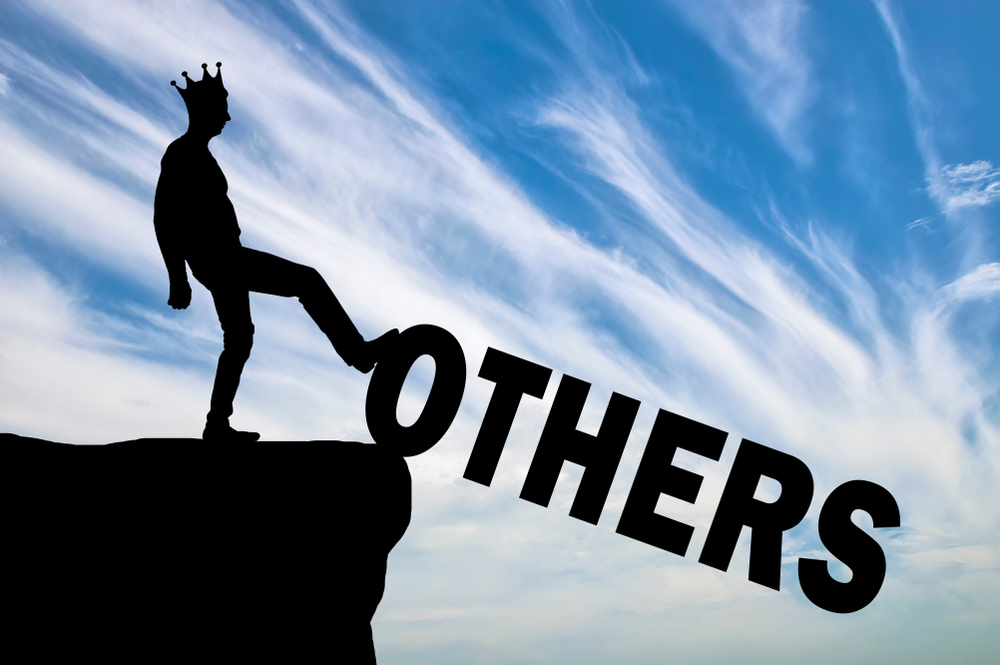Signs of a Narcissist Friend: Protecting Your Mental Health
Learn about narcissistic friends, their selfish traits, and their impact on your life. Explore how to deal with them while prioritizing your well-being.

The study of narcissistic friendships opens our eyes to a complicated reality. Such narcissist friends have an inbuilt self-centeredness that can profoundly influence your life. They continuously put their needs, wants, and accomplishments before yours, often at your expense.
These people have a pronounced lack of empathy. Relationships with narcissistic friends can negatively impact your emotional health, leaving you feeling continuously used, irrelevant, or invalidated. But don’t worry; we have got you covered!
There are clear signs of a narcissistic friend that can help you recognize them in your group, but it's important not to jump to conclusions based on just one of these signs. If you notice a consistent pattern of these signs, it's wise to prioritize your mental well-being rather than confronting a narcissist directly.

Being in a friendship with a narcissist can be difficult and emotionally taxing. Our contributor Jessica Alderson, a relationship expert, shares, “It's possible for someone with narcissistic traits to have genuine friendships, but maintaining a healthy and fulfilling friendship may be challenging. The likelihood of a true friendship is dependent on the degree of narcissism in the individual, as well as their self-awareness and willingness to change. It generally isn't an easy journey, but it is possible.”
However, for people who have a narcissist friend, our contributor Jessica Alderson gives a piece of advice, saying, “It's important to set boundaries with narcissistic friends. Stay calm but assertive when communicating your needs. Don't let them manipulate you or guilt-trip you, and don't take responsibility for their behaviour. You might want to consider taking some time away to reflect on the friendship and decide if it is healthy for you.” Remember these 20 narcissist friend signs as they will assist you in building a safety net against the toxicity of such individuals.
1. A Constant Need for Admiration

Narcissistic individuals constantly seek admiration, and this is shown by their intense hunger for approval, compliments, and attention from others. They will go to tremendous lengths to obtain these affirmations because they believe they deserve admiration and preferential treatment.
These attention-seeking behaviors, such as excessive boasting about their accomplishments and persistently looking for compliments, are frequently used to express this need for admiration. They rely on it to maintain their inflated self-image and thrive on the compliments and praise bestowed upon them by others.
Always look out for these major signs of a narcissist friend that include fishing for compliments, seeking excessive attention, bragging about their accomplishments, and expecting constant praise and validation.
2. An Exaggerated Sense of Self-importance

Narcissistic people possess an inflated view of themselves, manifesting in their exaggerated belief in their abilities, achievements, and overall value. They consider themselves exceptional and superior to others. Because of their distorted self-perception, they consistently harbor a sense of entitlement and anticipate receiving favors and preferential treatment.
They are strongly convinced that they are class apart from others due to certain abilities, traits, or attributes. They feel that people should recognize and value their outstanding abilities, and this belief feeds their desire for attention and appreciation.
They might think of themselves as the "best" in various spheres of life, including work, relationships, or hobbies, and they would anticipate appraisals and validation for the same.
3. Lack of Empathy

The absence of empathy is one of narcissistic people's distinguishing traits. They find it difficult to relate to and comprehend the thoughts and feelings of others. Narcissists struggle with empathy because it takes the capacity to put one's viewpoint aside and sincerely relate to another person's feelings.
A narcissist's lack of empathy is established through various ways in their relationships. They can disregard their friend's feelings as unimportant or show little interest in them. The narcissist may react with apathy or even criticize their friend's feelings when they express their troubles or concerns, invalidating their experiences.
4. Exploitative Behavior

Narcissistic friends frequently take advantage of others for their benefit, engaging in exploitative behavior. They may use or manipulate people without considering their feelings or overall well-being.
When doing so, they could disrespect other people's needs and boundaries to attain their ambitions. Signs of such individuals include using others without considering their emotions, exploiting their vulnerabilities, and manipulating them for personal gain.
5. Center of Attention

Narcissistic people are always looking for ways to become the center of attention. In social situations and conversations, they exhibit a strong desire to command attention and be the center of focus. They might speak over others, take over conversations, or keep the conversation focused on themselves, oblivious to the viewpoints or contributions of others.
6. “Destined for Greatness” Delusion

Narcissistic friends frequently have exaggerated fantasies about their attractiveness, success, and power. They might fantasize about having a limitless fortune, fame, or living an extraordinary life. These delusions support their sense of superiority and self-importance.
Signs include grandiose daydreaming, fantasizing about endless success or power, and believing they are destined for greatness.
7. Sense of Entitlement

Narcissists think they deserve special treatment and privileges. They anticipate others to fulfill their demands and aspirations because they believe that rules and social norms don't apply to them.
They could become irate or outraged when they don't get the treatment they believe they deserve. Some signs include expecting special treatment, feeling entitled to privileges, becoming upset when not receiving special care, and disregarding rules and boundaries.
8. Don’t Like to Be Blamed

Narcissistic people rarely accept blame for their errors or failures. They don't want to be held accountable for their actions or even apologize for their mistakes. To shrug off accountability, they frequently place the blame on someone else, invent justifications, or manipulate others.
9. Exert Power

Narcissistic friends always strive to have control over others and situations. They may try to manipulate people into doing things their way because they have a strong desire to be in charge.
When they are unable to exercise control, they become uncomfortable and may react angrily. Symptoms include wanting to control people, manipulating circumstances to have control, getting upset when they can't, and imposing their will on others.
10. Jealous of Others

Envy and jealousy are some of the common characteristics of a narcissistic friend. Narcissists have a strong need to be in the spotlight and be the sole recipient of praise and admiration. The narcissist may feel insecure and inadequate when another person is praised or succeeds.
Narcissistic friends can't be appreciative of someone else’s achievement. They find it difficult to recognize and value other people's good work since it questions their own sense of superiority and uniqueness. They may grow resentful or display hostility towards their friend if they receive praise in their presence.
11. Overstepping Personal Boundaries

Narcissistic people frequently violate personal boundaries in their friendships. They cannot understand or accept the need for their friends to establish personal bounds, which might result in intrusive and improper actions. Narcissists often invade others' personal and emotional boundaries, frequently disregarding the comfort of those around them.
Their friends feel uncomfortable, violated, or trapped because of their disdain for personal boundaries. Narcissists may emotionally transgress boundaries by prying into private matters or revealing confidential information without permission. They often cross emotional boundaries and expect others to be transparent while refusing to do the same themselves.
They might take advantage of secrets told in confidentiality and use the information to manipulate or exert power over their companions. Symptoms include invading others' personal space, meddling with their private affairs, giving away someone’s secrets, and disrespecting privacy.
12. Disinterested in Others’ Goodwill

Even in the context of friendship, narcissists frequently struggle to retain a real interest in their friends’ goodwill. Initially, they may seem genuinely interested as they engage in conversations and ask questions. However, this attention often doesn't last and is driven by their selfish motives.
Friends with narcissistic tendencies could probe for information that they might later use to their advantage. They might betray their friends or act against their best interests as soon as they see a chance to stand out in a social situation. If you have a narcissistic friend, it's not uncommon for them to make jokes at your expense to impress others.
Furthermore, their interest in other people can just be a front to appear friendly so that they can later assert power. They might purposefully ask questions to push conversations toward topics that highlight their successes, adventures, or passions. You can easily spot such individuals by observing signs like displaying shallow interest that doesn't truly reflect concern for their friend's well-being.
13. Manipulation

One of the main traits of narcissists is manipulative behavior. They can naturally influence people to get what they want and take control of circumstances. They skillfully manipulate the feelings and actions of those around them, using charm, compliments, guilt-tripping, and emotional manipulation.
Narcissists are extremely skilled at spotting and taking advantage of other people's weaknesses. They have a good sense of observation and can quickly identify the factors that affect their peers. Once they have discovered these weaknesses, they use them as bargaining chips to win support, allegiance, or attention.
They often employ flattery and charm as manipulative tactics, showering their friends with insincere compliments to create a likable persona and position themselves as a trusted confidant. Symptoms include controlling others by emotional means, guilt-tripping, and preying on people’s vulnerabilities.
14. Can’t Stand Criticism Or Feedback

Narcissists struggle mightily to cope with any kind of criticism or feedback because of their weak egos and a strong need to maintain the perceptions of their superiority and perfection. Criticism undermines their value and negates their self-perception.
When criticized, narcissistic people frequently react defensively. They could exhibit reactivity and hypersensitivity, taking any criticism personally. This defensiveness is a defense mechanism they use to preserve their frail ego and sense of superiority.
They could assign blame, offer justifications, or shift the focus to others rather than consider the validity of the criticism. Becoming defensive when criticized, reacting indignantly or hostilely, discounting or disregarding reliable feedback, and being unable to receive constructive criticism are all signs of a narcissist.
15. Lack of Reciprocity

When it comes to kindness or help, narcissistic individuals often display a lack of reciprocity in relationships, failing to give back or show appreciation in return. While they may easily accept and profit from other people's generosity and readiness to help, they hardly ever reciprocate with the same level of concern or support. They put their demands before others because they are self-centered.
Taking advantage of the generosity of others without returning the favor is one of the main signs that prove their lack of reciprocity. They take advantage of their friends' kindness and generosity by frequently expecting support, attention, or favors in exchange for nothing in return.
They might exploit the resources or emotional energy of others, taking what they can without considering the impact on the other person. Signs include using people's kindness without giving back, a lack of gratitude, and expecting others to meet their needs without offering support in return.
16. Shallow Relationships

Relationships with narcissists are frequently superficial and one-sided. Self-interest and self-gain are the main aspirations behind their interactions with others. Instead of seeing people as beings with unique emotions, desires, and aspirations, they see them as things or tools that they can use for their gain.
The narcissist puts their own needs first, thereby resulting in shallow relationships. They constantly seek the approval, acclaim, and affirmation of others to support their fragile self-esteem. They might only date to advance their social status, acquire material goods, or receive other external benefits.
The narcissist will abandon or devalue relationships when they are no longer serving them, form superficial ties, and use others for their gains, as elaborated above.
17. Arrogant Behaviour

A prominent trait of narcissists is arrogant behavior. They have an exaggerated sense of their significance and think they are better than others. Because of their inferiority complex, they feel the need to minimize, denigrate, or undervalue others around them to retain their sense of superiority.
Narcissists have a strong sense of their specialness, brilliance, or intelligence. They frequently look for chances to show off their dominance and win people over. They will boast about their accomplishments to no end, exaggerate their talents, or persistently look for confirmation of their self-perceived grandeur.
Their haughtiness extends beyond self-promotion. Additionally, narcissists may exhibit a dismissive or arrogant attitude toward the beliefs, innovations, or achievements of others.
Their arrogance stems from their belief that other people are beneath them and hence their opinions aren’t as valuable as their own. In a display of arrogance, a narcissist often interrupts others, taking over the stage to put themselves in the spotlight. Some of the major narcissist friends' traits are condescending or patronizing behavior, dismissing others' accomplishments or abilities, and behaving arrogantly.
18. Lack of Genuinity
Genuineness may be an alien concept for a narcissistic friend. If you have noticed that a friend consistently alters their opinions based on their surroundings to appear impressive or gain approval, it could be an indication that this friend is exhibiting narcissistic traits.
Narcissists are adept at utilizing all kinds of manipulation to further their agenda. Consequently, they may adapt their beliefs and viewpoints to align with those around them, rather than expressing genuine convictions. This behavior stems from a desire to be seen as knowledgeable, influential, or superior in social interactions. It is important to be aware of these signs as they can help you recognize and understand the narcissistic tendencies of individuals in your life.
19. Short-lived Friendships

Maintaining life-long friendships is extremely difficult for narcissists. The inability to empathize with others and their self-centeredness prevent them from developing lasting relationships. Instead of genuinely caring about their friends' well-being, their friendships are frequently superficial and motivated by their personal needs and ambitions.
Narcissists put their own demands ahead of their friends and frequently look for adulation. Narcissists don't typically contribute equally to maintaining a friendship. Instead, they often prioritize their own needs and interests, leaving their friend feeling neglected or undervalued. Being friends with a narcissist can make you feel alone in the relationship, as they focus mainly on themselves. This one-sided dynamic can lead to the friendship ending shortly after it begins, as the imbalance becomes apparent.
20. No Self-reflection

Narcissists, due to their unwavering belief in their greatness, rarely engage in self-reflection. Unlike most people who question their decisions and engage in introspection, narcissists seldom experience moments of self-doubt. Their delusional beliefs in their abilities and superiority shield them from the need for self-reflection.
Furthermore, narcissists actively avoid criticism and feedback, which means they rarely have anyone around them who can challenge their faults and mistakes. This lack of external accountability reinforces their perception of being faultless and further validates their inflated sense of self.
Unlike the typical individual who acknowledges their own shortcomings, a narcissistic friend rarely enters a self-reflective state or takes responsibility for their wrongdoings. This distinctive trait sets them apart, as most people do not possess such unwavering self-confidence in their abilities. This characteristic makes them stand out, as it is uncommon for individuals to possess such a steadfast self-belief without acknowledging their flaws.
Conclusion
It can be difficult and confusing to manage a friendship with a narcissistic friend. It necessitates a thorough comprehension of their particular traits and behaviors. For preserving personal well-being, it is essential to recognize the symptoms of narcissism and how they affect the dynamics of a relationship with them.
How to deal with a narcissistic friend will surely be the first question when dealing with these people. Setting boundaries to safeguard your well-being is the first and most significant step. You can do so by restricting intrusions and discouraging deceptive practices, and emotional demands. It's critical to remember that you cannot alter or correct a narcissist's behavior; instead, your attention should be on caring for yourself. So, bookmark these signs and spot the narcissist in your group to stay away from them.
Contributor: Jessica Alderson, Co-Founder & Relationship Expert - So Syncd Ltd.

11 Signs of Love Bombing to Watch Out For

Ariana Madix claims Tom Sandoval threw 'beer can' at her, opens up about 'manipulative' and 'narcissistic' ex





 JOIN OUR WHATSAPP CHANNEL
JOIN OUR WHATSAPP CHANNEL













































